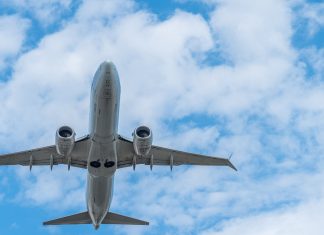SWISS today became the first airline in the world to deploy the innovative AeroSHARK technology on its passenger services.
The transparent AeroSHARK film which has been applied to its aircraft’s fuselage and engine nacelles replicates the hydrodynamic skin of a shark to reduce aerodynamic drag and, as a result, lower both inflight fuel consumption and carbon dioxide emissions. SWISS’s first scheduled flight to use the new technology took off from Zurich for Miami today (Friday) at 13:39.
Swiss International Air Lines (SWISS) has become the first airline in the world to deploy the carbon-efficient AeroSHARK film technology on its passenger services. SWISS’s first Boeing 777-300ER to be equipped with the new film – registration HB-JNH – carried its first revenue passengers today (Friday), departing from Zurich for Miami at 13:39. SWISS’s AeroSHARK programme is also supported by the Swiss Confederation via the latter’s special funding for environmental projects.
“Our adoption of AeroSHARK is an excellent example of how we can use innovative technologies to make air travel more sustainable,” says SWISS CEO Dieter Vranckx. “Our aircraft fleet is already one of the most advanced and most carbon-efficient in Europe. Thanks to AeroSHARK, we can enhance these credentials even further in a field where every saving counts. We are proud to be the first passenger airline in the world to adopt this new technology. And we will continue to consistently invest in such sustainable solutions.”
AeroSHARK is a special film which has been jointly developed by Lufthansa Technik and chemicals and coatings manufacturer BASF. The film features tiny 50-micrometre riblets that reduce aerodynamic drag during flight. SWISS and Lufthansa Technik have applied the technology – which draws its inspiration from the skin of sharks – to a first aircraft within the SWISS Boeing 777-300ER fleet, and have trialled the innovation for its inflight performance together with external specialists over the past few weeks. All twelve of SWISS’s Boeing 777s should now be gradually equipped with the new AeroSHARK film.
AeroSHARK is just one of the ways SWISS is striving to reduce its carbon dioxide emissions and make air travel more sustainable. Its further actions here include investing in sustainable aviation fuel (SAF), which is manufactured from biogenic waste and presently produces some 80 per cent less carbon dioxide than conventional kerosene. SWISS already uses SAF, and is promoting and supporting further research and trials in the field together with the Lufthansa Group. SWISS has set itself the goals of halving its net carbon dioxide emissions from their 2019 levels by 2030 and being entirely carbon-neutral by 2050.
























